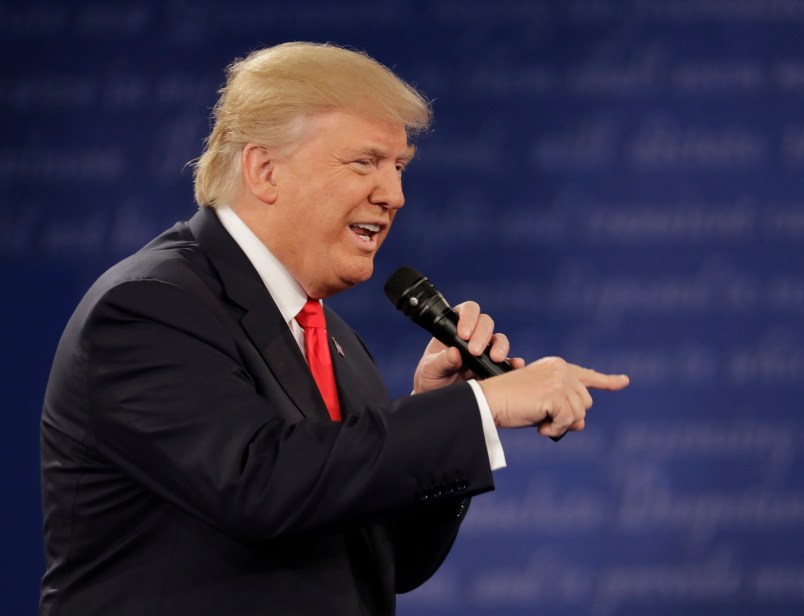During the second presidential debate on Sunday night, Donald Trump directed his ire not only at Hillary Clinton but at the debate’s moderators.
Trump turned to CNN’s Anderson Cooper and ABC News’ Martha Raddatz, who co-moderated the town hall-style event, to complain about being repeatedly interrupted and not being given time to respond to questions.
The GOP nominee’s first complaint came just ten minutes into the debate, at the end of Clinton’s comments reacting to a 2005 conversation caught on tape in which Trump made predatory comments about forcing himself on women and said he could do “anything” to them as a result of his fame.
“And we want to get to some questions—” Raddatz began.
“Well, am I allowed to respond to that?” Trump interrupted. “I assume I am.”
“Yes, you can respond to that,” Raddatz said.
Trump launched into a rambling response about inner-city crime, prompting Raddatz to cut him off. “I want to get to audience questions and online questions,” she said.
“So she’s allowed to do that, but I’m not allowed to respond. Sounds fair,” Trump complained.
Fifteen minutes later, Trump interrupted first Clinton’s response to a question on her use of a private email server as secretary of state and then the moderators’ attempts to move on to other subjects.
“Okay, we’re going to move on,” Raddatz said as Clinton finished her answer on the email server.
“And yet she didn’t know the letter C on a document. Right?” Trump jumped in, and went on to express his disappointment in everyone from Congress to the Justice Department before turning back to Clinton to say that she should be “ashamed.”
“We have to move on,” Cooper interrupted. “Secretary Clinton, you can respond, then we’ve got to move on.”
Trump wasn’t finished, however. “If you did that—one minute!” he said. “One second! If you did that in the private sector—”
“We want to give the audience a chance here,” Raddatz interjected.
“You’d be put in jail, let alone after getting a subpoena from the United States Congress,” Trump continued.
He went on to speak over Clinton for over a minute as Cooper tried to interrupt.
“She didn’t talk while you talked,” Cooper told Trump.
Even after Cooper brought up an audience member to ask about healthcare, Trump seemed unwilling to drop the subject. “I’d like to know, Anderson, why aren’t you bringing up the emails?” he asked. “I’d like to know. Why aren’t you getting the emails?”
“We brought up the emails,” Cooper responded.
“No it hasn’t,” Trump said. “And it hasn’t been finished. At all.” As Cooper pivoted to the audience question, Trump still wasn’t done and seemed to accuse the moderators of ganging up on him with Clinton.
“It’s nice to—one on three,” he said.
Trump clashed with the moderators again when an audience member interrupted his response to a question on his proposal to ban Muslim immigration.
“Why don’t you interrupt her?” he demanded. “You interrupt me all the time. Why don’t you interrupt her.”
His next clash with the moderators came after a question on the humanitarian crisis in Syria. Trump claimed that Clinton went over her time for a question, a claim the moderators disputed.
“She went 25 seconds overtime,” Trump said. “Can I respond?”
“She did not,” Raddatz said.
“Can I respond?” Trump asked.
“Please,” she replied.
Trump was many times told not to interrupt Clinton, with moderators having to remind him that Clinton did not interrupt when he spoke. One such heated moment involved Trump telling her that if she was an “effective senator” she could have singlehandedly changed policy.
“Well, here we go again, I’ve been in favor of getting rid of carried interest for years, starting when I was a senator from New York,” Clinton said. “But that’s not the point here.”
“Why didn’t you do it?” Trump demanded.
“Allow her to respond,” Cooper said.
“Because I was a senator with a Republican president,” Clinton replied.
“Really? You could have done it,” Trump said. “If you were an effective senator, you could have done it. If you were an effective senator, you could have done it.”
“Please allow her to respond, she didn’t interrupt you,” Cooper said.
Trump also seemed to think that Clinton was given more time to speak. But according to a CNN calculation, Trump spoke for just over a minute longer than Clinton in total.
“Thank you very much, we’re going to move on,” Raddatz said at one point.
“She went over a minute over and you don’t stop her. When I go one second over—” Trump complained.
“You’ve had many answers,” Raddatz said.
“It’s really very interesting,” Trump said.







Drinking game:
neither did you Donald, neither did you
by the way, the only way that he gets back into the race is if others believed that he was ganged up on yesterday,
Already on defense D ? ? … That means …–
Somewhat off topic but I wanted to share a reaction of my 80+ year old Russian speaking parents. Their level of English is such that at a fast conversational rate on TV they only get a general context, probably way below 50% of details. The one most notable reaction from them was:
He (Trump) does not have any plans, no details whatsoever. It is only “I have a plan” and “believe me” but no plans. When she speaks we can’t follow in details but she describes her plans, he has nothing.
I thought this is a very noteworthy reaction and, hopefully, the native speakers will have a similar reaction.